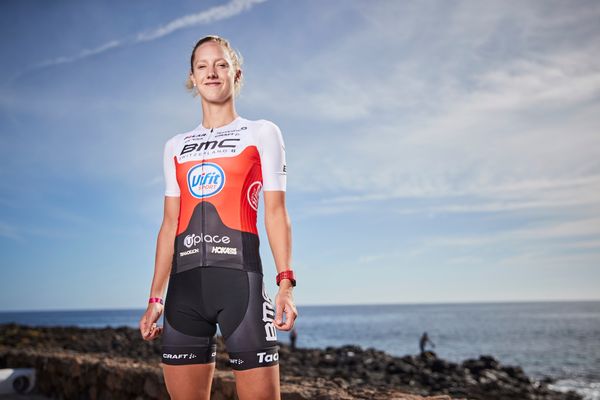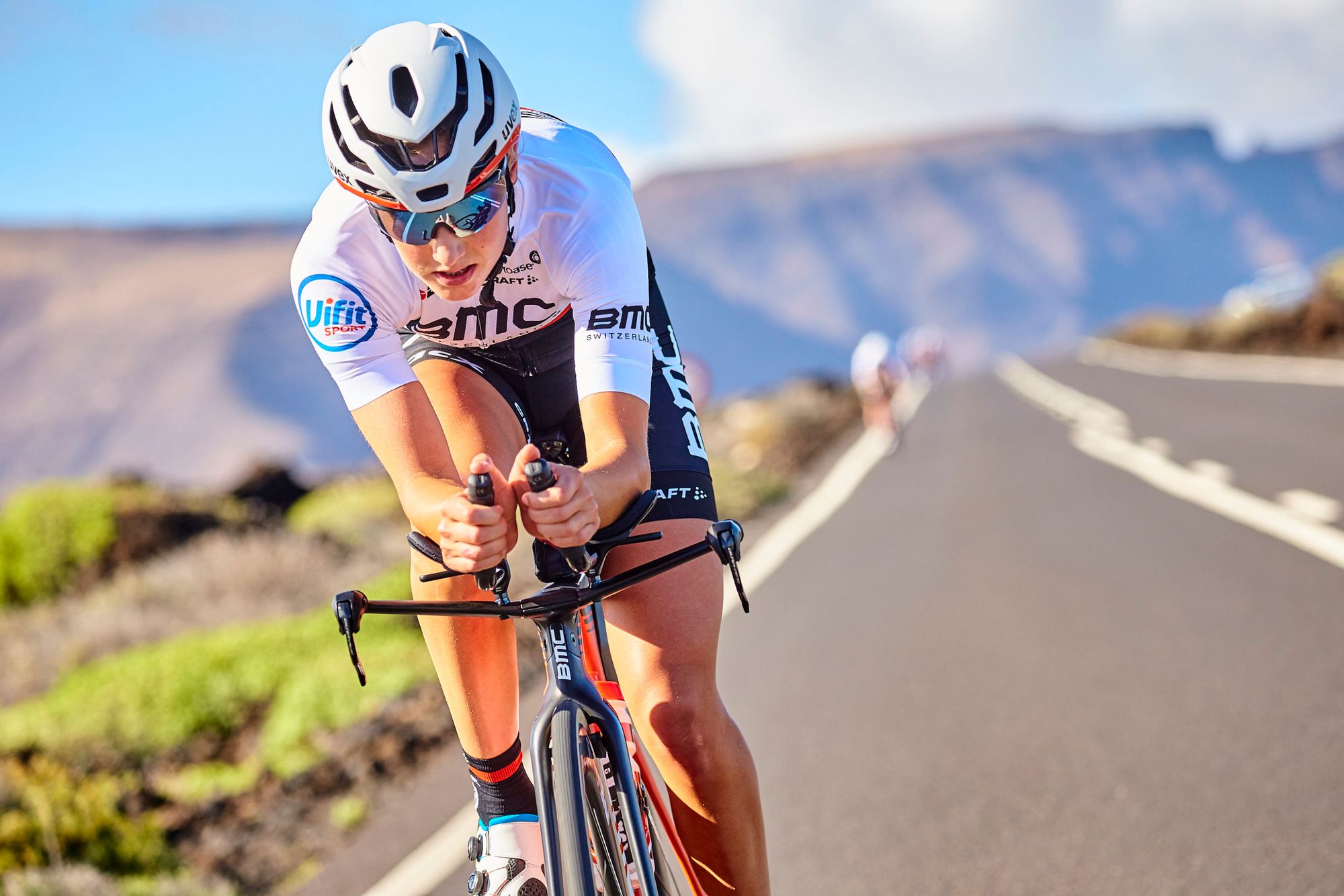Emma Pallant: From Amateur Runner to World-Class Triathlete
After clinching the win at Ironman 70.3 Barcelona and overcoming injuries, Emma Pallant exemplifies resilience in her journey from running to world-class triathlete.

After clinching the win at Ironman 70.3 Barcelona and overcoming injuries, Emma Pallant exemplifies resilience in her journey from running to world-class triathlete.

British triathlete Emma Pallant has just won a gold medal at Ironman 70.3 Barcelona last weekend for the second year in a row. She also holds a silver medal from the Ironman 70.3 World Championship in Chattanooga, and she became the International Triathlon Union (ITU) World Duathlon Champion and British Duathlon Champion in 2015.
Trizone chatted with Pallant before the Barcelona race about her 2018 season. She shared stories and insights about her training, an injury from a December bike crash, another injury in April, recent victories, and her outlook on upcoming triathlons. She also chronicled her evolution from a runner to a duathlete to a short-course, then a long-course, triathlete.
Pallant began training for triathlons in 2013 after she met her first triathlon coach, two-time Olympian Michelle Dillon. Pallant had a solid running background, but little experience in swimming and cycling. She already had a number of injuries as well. When she told Dillon she wanted to be a world-class triathlete, Dillon took her in with a great enthusiasm that surprised her.
Pallant joined Michelle’s Team Dillon that year. During her tenure on the team as a resident, which spanned through a good portion of 2016, she participated in a number of short-course and Olympic distance duathlons and triathlons. However, she learned that it just wasn’t her thing. “With the swim not being my strongest, I was always chasing the leading packs on the bike,” she said.

The swimming handicap, along with obstacles preventing her from trying out for the Rio Olympics, made Pallant decide to look into longer races. In 2016, she set her sights on Ironman 70.3 triathlons. Each course features a 1.9km swim, a 90km bike, and a 21.1km run. This makes the swim leg a smaller percentage of the race.
While Team Dillon now includes long-distance athletes, they mainly specialized in short-course races at the time. Pallant wasn’t ready for longer ones in the beginning. “I was fainting in races. I was always dying at the end. Every race was a trial on the nutrition front,” Pallant said. Luckily, she had access to a nutritionist and medical professionals within the team.
By the end of the year, Bob De Wolf, CEO of BMC Vifit Sport Pro Triathlon Team, contacted her. She soon joined the team, which includes a number of world class triathletes from around the world. Like Team Dillon, it also includes a physiologist, a doctor, a masseuse, a nutritionist, and other professionals.
Like Team Dillon, members are dispersed geographically. They often come together to do “camps”, or periods of intensive training. They also meet up before and after triathlons. For example, when Pallant and some other members learned they were all going to race in Barcelona in 2017, they made plans. “We planned on an extra week so we could eat together and talk about our experiences. We each did our own training. It was kind of cool being able to hang out and do the same things,” Pallant said.
Pallant recalled conversations between team members that were educational as well. “I think it’s fun, and it’s really good for the highs and lows. If one person didn’t get the outcome they wanted, we can learn from the good and the bad. I think, definitely, as a team, it makes you stronger for sure.”
Pallant was injured in a mid-December bike crash, but she still managed to make the podium at Ironman 70.3 South Africa 2018 the next month. “I did rehab, and I decided to race a 70.3 at the end of January. It was to motivate a kind of acceleration back in. I came in second there,” Pallant said.
The silver medal gave Pallant motivation to aim high for her first full-distance triathlon, South Africa’s Ironman African Championship in mid-April. “Ultimately, this is the distance I want to do,” she said.
Pallant re-joined her Team Dillon family at the end of February. She worked as a coach in a week-long training camp for age-group triathletes in Mojacar, Spain. She also spent a few weeks training for the African Championship there.
Unfortunately, Pallant had to settle for a “Did Not Finish” in South Africa because she injured a nerve in her calf during the bike leg.
“My calf went out halfway into the bike. I was trying to get lower in positioning. I’m quite flexible. I do yoga. I thought I could get down into a more aero position. But then, if you’re in that position for five hours straight, well, you know,” Pallant said.
She continued, “I assumed it was a cramp. I treated it as a cramp, and I didn’t run for a week. I had a load of deep tissue work done on it. I couldn’t run with it off the bike. It just felt like it was on fire. It didn’t get much better. The physio and masseuse worked on me at the BMC camp, and the masseuse said I had a trapped nerve in L5. We treated that, then I was back running.”
Unexpected events can disrupt plans, especially if you have races in the near-future. About such setbacks, Pallant said, “I couldn’t plan my goals much because I didn’t know how long it would take to heal.”
For her, the calf injury and other unfortunate events aren’t really setbacks, however. “Sometimes things are gonna go wrong that you weren’t expecting. To deal with it, that you did not finish, it feels pretty rotten. But then I think you can change that, flip that on its head,” Pallant said.
She continued, “As soon as I’m refocused on the next goal, then I just use that as the drive. I’m looking to my next race, and looking at what I can learn from this. What areas did I learn from the race that did go well, and what can I implement in training? Whether you win or lose, I think you should respond the same. It’s still education. It’s still your plan. You can use it in exactly the same way.”
The injury caused Pallant to cancel her spot in Spain’s Ironman 70.3 Marbella, which was at the end of the month. However, her impeccable resilience and winner’s mindset soon paid off. She won a gold medal at the Mallorca Olympic Triathlon just three weeks after the injury.
Despite the mayhem, Pallant found during the African Championship that full-distance races are the way to go.
“I was actually really relaxed going into the race,” Pallant said. “To me, Super League, a much shorter race, was a nightmare. I’m not the quickest in transitions. Literally, you make one mistake and that’s it. You’re out. At the Ironman, I went in with a particular mindset. If you mentally know what you can handle because of what you’ve been through in training, then you know that, whatever happens, you can get to that finish line. It made me respect the event a lot more.”
Pallant has just finished with a gold medal at Ironman 70.3 Barcelona on May 20th. That’s not too surprising, as she has a couple months of great training sessions behind her. Next up is the Ironman 70.3 Samorin, just two weeks later.
Trizone asked what she expects for that race. Pallant said, “It’s leading into summer, and it’s totally the kind of course that I wouldn’t normally choose to go to. I’m going only because it’s such a fantastic event, and a lot of the top girls will be there. I kind of have been persuaded to do it. I still think it’s good course to work on your weaknesses, for trying to make yourself a more robust athlete.”
She further elaborated on the course. “I think it’ll be a pretty fast swim, a really big power bike, and I think the run course has a little bit of everything,” she said. “It’s a fast kind of road surface.”
Regarding the calibre of the race, she said, “I think it’s a massive event. They have loads of media, and they’re going to do a pretty good job of covering it. They also want to help the pros with accommodation so that we get the best view. Hopefully, that makes for an exciting race.”
The “top girls” Pallant expects to see are last year’s podium finishers: Lucy Charles, Annabel Luxford, and Heather Wurtele.
“Annie Thoren will be key in my race,” Pallant said. “She’s super strong on the swim. I need to hold onto her on that and on the bike because her run is phenomenal. I definitely think she’ll be a massive contender.”
About her training before the event, Pallant said, “We’re just gonna try to get as many bike power sessions in as possible. The swim and the run won’t change a massive amount. I’ll be doing really hard work on the bike and just trying to get my strength and power up as much as possible.”
Pallant is confident that the two weeks between Barcelona and Samorin is sufficient time to recover for the latter.
“I can probably do 3 or 4 races in a row, and then I need another training block,” she said. My training’s very high volume. I find that the more races I do, the better. The tapering drives me a little bit mental, so I have to be careful. I have Staffordshire, which is the weekend after, so another 70.3. It’s just a matter of swinging that in. That’ll be enough.”